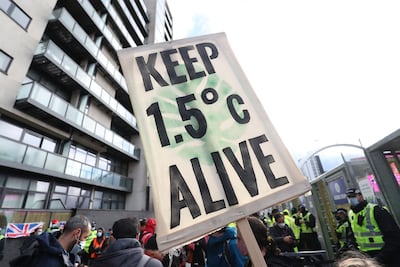The latest UN report on climate change makes for grim reading.
Released in October, the study from the UN Environment Programme said there was no “credible pathway” to keep global temperatures from rising above 1.5°C on pre-industrial levels with the world on course to warm by around 2.8°C.
If temperatures climb above this vital threshold, scientists believe half the world's population could be exposed to life-threatening heat and humidity.
The report said only an “urgent system-wide transformation” can avert climate disaster.
Grantham Research Institute, London School of Economics
It came just days before the world meets in Egypt's Sharm-El-Sheikh for the Cop27 climate summit.
Amid a tense geopolitical environment, can the crucial November 6 to 18 gathering make any difference?
What happened at last year’s Cop26 in Glasgow?
Cop26 was the first time since the 2015 Paris deal that countries revisited their pledges to cut emissions.
Paris was signed in 2015 and agreed on the need to limit global warming to below 2°C and ideally to 1.5°C on pre-industrial levels. Global temperatures have already believed to have risen by about 1.1°C.
Nations at Cop26 recommitted to 1.5°C and it was agreed to revisit pledges to cut emissions again by the end of 2022 because of the urgency. This is supposed to happen once every five years. However, only a handful have submitted revised pledges.
Countries at Cop26 also made a historic agreement to “phase down” the use of coal – responsible for 40 per cent of annual CO2 emissions - and 141 leaders agreed a deal to mitigate forest loss.
Developed countries also reaffirmed their aim to provide $100 billion a year in support of poorer countries to help them reduce emissions and prepare for climate change. This funding was supposed to have been in place since 2000 but the deadline has been missed and was moved to 2023.

What will be discussed at Cop27?
Egypt said it wants to make the summit about “implementation”. This means assessing three main areas: cutting emissions; adapting to climate change; and providing money to help vulnerable countries do both.
It is finance that is expected to dominate much of the discussion and the Egyptian presidency will want agreement on when the $100bn yearly commitment will be in place.
“This is very important in terms of ... rich countries keeping their word,” said Bob Ward, policy and communications director at the Grantham Research Institute on Climate Change and the Environment at London School of Economics.
“In African countries, the threat of impact is much more significant as they are less able to protect themselves. Negotiations will be about immediate support for them."

Asher Minns, executive director of the UK's Tyndall Centre for Climate Change Research, University of East Anglia, said finance was potentially the single most important issue at Cop27.
“Finance for poor countries, both to cope with the increasing impacts of climate change on their economics, and finance for leapfrogging fossil fuels as their economies grow and require more energy,” he said.
It is also expected Cop27 will hear calls for the historically controversial issue of “loss and damage” funds to be placed on the agenda for the first time.
What are ‘loss and damage’ funds?
Developing countries want “loss and damage” money from rich countries to compensate for damage done by climate change rather than just funds to prepare for its consequences.
This has proved controversial in the past with rich countries reluctant to be on the hook for damage caused by industrial activity.
But it has been in sharp focus this year with devastating floods swamping Pakistan that put 33 million people into devastation. Pakistan is responsible for just 1 per cent of global emissions, whereas the G20 is responsible for 80 per cent. It also feeds into the notion of climate justice.

Countries at Cop26 did not agree to establish such a fund but agreed to a dialogue.
Egypt along with China and the "Group of 77" — a set of developing countries — want it included as a topic for discussion on the Cop27 agenda that will be set at the start of the summit.
“This is a big issue for poorer countries,” said Mr Ward. “The damage they suffer can set back economic growth severely. But it occurs in every country. Hurricane Ian in Florida shows even richest country suffers loss and damage.”
Denmark and some other countries said they would contribute to such a fund and Mr Ward said further pledges could be made at Cop27 but not on the scale developing countries want. “The danger is that this will be a divisive issue and seen as [richer countries] kicking the can down the road.”
What would be considered a successful summit?
Developing countries will want to see firm commitment on the $100bn financing goal and want “loss and damage” on the agenda.
Pledges on forests and methane made at last year’s Cop26 that are signed by more countries would be welcome.
The relationship between China and the US is crucial as they are the world's biggest emitters. China is responsible for about a third of global emissions; the US about 14 per cent; and India and the EU at around seven per cent each.
“Delivering on decarbonisation is needed,” said Mr Minns. “And money for poor countries to put them on a different trajectory both for coping with climate impacts and growing their economies without fossil fuels. And then, absolute decarbonisation of western economies and China.”
Keeping all countries onboard will also be a mammoth challenge. Russia’s invasion of Ukraine has inflamed global relations and led to energy and food price increases, while US-China ties are tense since US House of Representatives speaker, Nancy Pelosi, visited Taiwan in August. Developing countries need support, while richer countries have their own cost of living crises. US President Joe Biden said he will attend, yet he faces crucial mid-term elections on November 8 that could impact his ability to push through his agenda. The two-day G20 summit also takes starts on November 15.
Anything included in the final Cop27 agreement will also require the unanimous approval of more than 190 countries
“Any country can prevent agreement,” said Mr Ward. “Tensions can arise about seeking ambitious outcomes while trying to keep everyone onboard. It will be a difficult Cop because of geopolitics.”
As the UN report stated, the 1.5C goal is on life support. It remains to be seen if countries will agree on the far-reaching and swift emissions cuts needed by 2030 to keep it alive.
“If there are advances on ambition and finance then there should be enough momentum to be optimistic about the prospects for further progress at Cop28 in the UAE next year,” said Mr Ward.

Role of the Middle East and North Africa
Experts also say the hosting of Cop27 in Egypt and next year’s in the UAE means the Middle East and North Africa can play a key role in shaping a tangible global climate action plan.
"With Egypt, there is more of a move to encouraging national climate action and less of the big international agreeing everything together aspects of previous Cops,” said Mr Minns.
Prof Jos Lelieveld, of Germany’s Max Planck Institute for Chemistry, said he wasn’t optimistic the goals of Paris would be reached but he was hopeful the urgency of the problem was being accepted.
“I am hopeful … societies will more actively pursue the transition from fossil to renewable energy resources,” he said. “The Middle East has a great opportunity in this respect.”




















